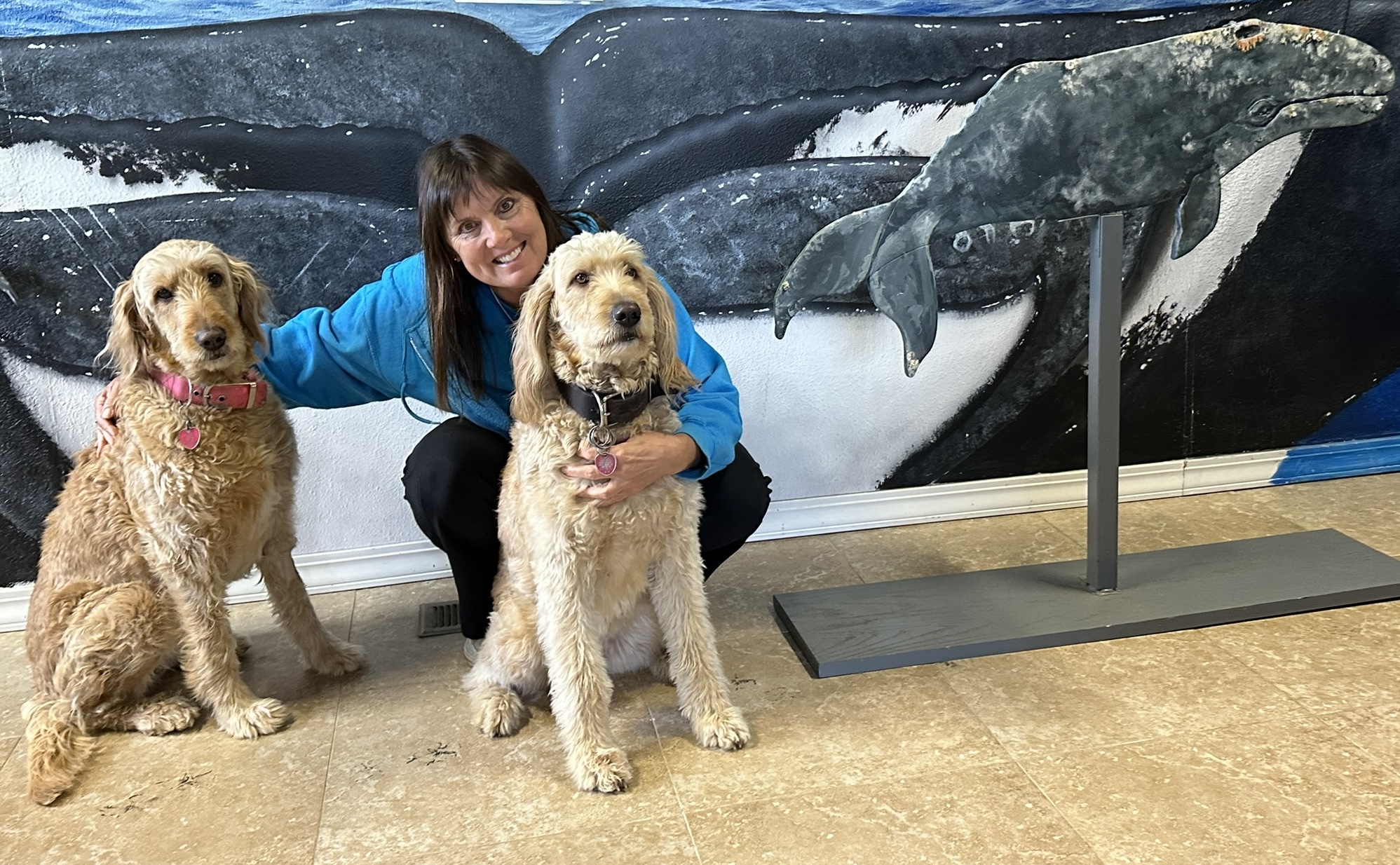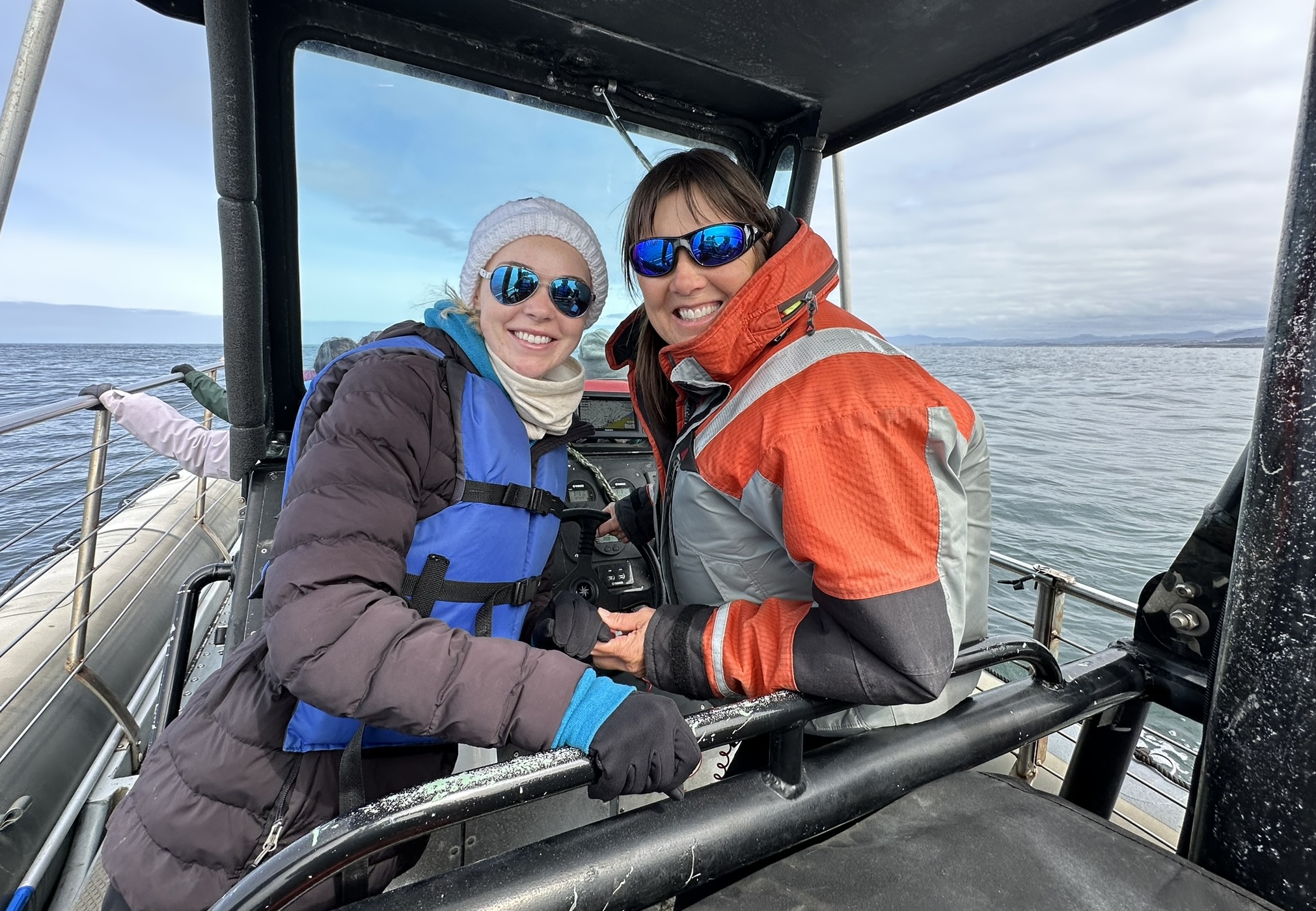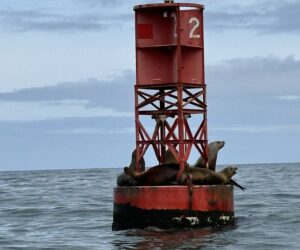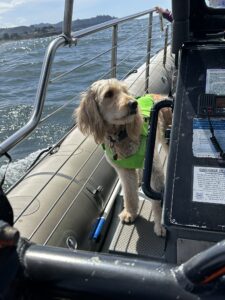
By KATHLEEN O’CONNOR/Lincoln Chronicle
Some people are so kinetic and spirited that they practically sparkle. Carrie Newell, the owner of Whale Research EcoExcursions might be one of those people. During the summer season in Depoe Bay, she pilots four whale-watching trips a day, seven days a week.
 She grew up around water near Lake Huron in Michigan. When she was a child her favorite TV shows were Flipper, The Undersea World of Jacques Cousteau, and even Gilligan’s Island — anything to do with water. Swimming and later scuba diving in Lake Huron she dreamed of meeting Jacques Cousteau, maybe even someday working with him.
She grew up around water near Lake Huron in Michigan. When she was a child her favorite TV shows were Flipper, The Undersea World of Jacques Cousteau, and even Gilligan’s Island — anything to do with water. Swimming and later scuba diving in Lake Huron she dreamed of meeting Jacques Cousteau, maybe even someday working with him.
Newell’s journey to becoming a marine biologist took her to four states before she landed in Eugene. Along the way she earned three college degrees, all in science.
Once in Oregon she sought to learn more about the ocean, specifically the gray whales. Why, she asked herself, did Depoe Bay have so many whales each summer? What were they eating? She was the first to discover that the whales feast all summer on mysid shrimp, which are teeming in the bay.
She began pursuing her fourth degree, this time in oceanography at Oregon State University and her research caught the attention of Jacques Cousteau’s son, Jean-Michel Cousteau. In 2004 she got to share her studies with him and dive with his team – and realized her dream.
It was the Cousteau team who suggested Newell start offering whale watching trips to help pay for the expenses of earning her OSU degree and raising two daughters on her own. This was no small feat as she had to get her captain’s license and find a boat.
She started small, but now has five boats, three full-time captains and two part-time captains. Besides that, she runs the Whale Sealife and Shark Museum, the Whale Bites Café, three Airbnb units, an annual trip to the Baja peninsula in Mexico to see whales and an annual trip to Florida to see manatees.

On top of that, the children’s nonfiction book she wrote was published earlier this year. Koda and the Whales follows Koda, one of her two dogs, as Newell teaches her to spot whales in the bay. A whale’s blow is very foul-smelling, and Koda can identify that smell faster than humans can see the blow. She quickly learns that her job is to bark when she smells the blow, alerting everyone on the boat that a whale is near.
Koda is the second dog that Newell has trained to identify whales. The first was Kida.
Through Koda’s eyes Newell explains in the book that each whale’s markings are unique and illustrates whale behaviors such as fluking, spy hopping and sharking. Koda also learns that Newell firmly believes that one of the whales, one that she and other researchers named Scarback, came to say goodbye to Kida when cancer was taking her life. She fluked near the boat a dozen times on Kida’s last whale-watching trip.

Question: How do you find whales, and what if you don’t find them?
Answer: From Memorial Day to the end of October we are virtually guaranteed to see whales because the 212 summer resident whales are here. In April and May, we might see the migrating grey whales offshore as they travel north and in December we might see them as they travel south.

Especially during those months, I am grateful for my friends, Nancy and Steve Rasmussen. They are avid whale watchers from their condo on the bay, and if they spot a whale they call me. All the captains of the whale-watching boats let one another know when a whale has been spotted. However, whether we see whales or not, the ocean and the bay offer many types of wildlife to discuss. There are sea lions and seals, many types of sea birds and even seaweed. I share facts about all of them and love seeing people’s excitement when they learn something new. For example, most people don’t know a key fact about our most common local seabird, the Western gull. The red dot on its beak is a beacon for its chicks, who tap that spot with their beaks whenever they are hungry — which is always. The parent responds quickly by regurgitating food into the chick’s mouth.
Q: What makes your trips “eco”?
A: As a marine biologist I am acutely aware of the deteriorating condition of our oceans, so as a business owner I do everything I can to be proactive about the environment. I preach about eliminating plastic pollution in our waterways, and we always respect the whales and their habitat. If we see a whale in the distance we can move toward it, but must stay at least 100 yards away. If a whale comes up close to us unexpectedly we are delighted but must immediately cut our engines to keep them safe. I was a teacher/college professor for many years, so I use my whale watching trips to educate people about the entire marine ecosystem around Depoe Bay, and the conservation challenges that face many species.
Q: How did your childhood shape the person that you are today?
A: For as long as I can remember I have loved everything about the natural world. I started collecting rocks, minerals and fossils very early. Every small animal I encountered was fascinating to me. I learned about the land from my grandfather who let me drive his tractor and help with harvesting his crops. My father taught me about everything he was interested in — we got under cars together, built go-karts together, went snowmobiling. He made everything about building and repairing things fun for me. In high school I started multi-tasking in a big way. I kept my grades up and participated in student government and multiple sports. The “juggling” skills I learned in high school have served me throughout my life.
Q: What kind of research are you doing now?

A: Each year I take pictures of the whales I see on each voyage, and other sea life. I have terabytes of data which I share with researchers at OSU and then collaborate on the papers they write. I am watching to see which whales return, how long they stay, what condition they are in, and how many calves are with them. I have named many of the whales, and it’s an absolute joy to see each one as they return.
Q: How has your business grown and changed over time?
A: To give you some background, in the early ‘90s after my divorce, I lived in Arizona, teaching science courses at the local college and living on about $750 per month. When I got my teaching job at Lane Community College making $2,000 per month I was on Cloud 9. As I gradually gave up teaching to pursue my whale watching business I had to move slowly. I started my business with just one boat, packing all my supplies around with me in a plastic bin. Creating multiple income streams over time has helped me be successful – and certainly it helped me to survive covid.
Tell us a secret.
I was once hired to teach a course on birding at Yavapi College in Arizona. Even though I had a lot of background in science, including birds, I was only a novice birder. About half my class were members of the Audubon Society. I learned to be a much better birder very quickly as I worked to keep up with them.
- Kathleen O’Connor is a Waldport freelance writer who can be reached via email at kmoc8916@gmail.com





















I’ve lived on the Central Oregon Coast for 40 years, but it took my visiting cousin from Chicago to treat me to a whale-watching expedition and I am eternally grateful to her because otherwise I might never have experienced the rare thrill of being so close to an actual living Leviathan! We arrived towards closing time, but managed to snag a spot on the inflatable raft. Our “captain” kept us close enough to Carrie’s tour boat that we could hear most of her fascinating lecture to her passengers, while our pilot filled in the details. Christi and I agreed that although it seemed a little scary at times to be in the Zodiac, we preferred it to the boat because in the dingy, you are closer to the water and when a whale deigned to show us its back, we felt we could have reached out and tickled it!!
There are a lot of stairs to negotiate to get to the boats, but if you take your time and pace yourself, it’s manageable. They do have a plan for people with mobility issues~ see their FAQ’s on the website. If you want to give your loved ones and guests a unique experience that they’ll never forget,
take them whale-watching~ damn the expense, it’s SO worth it. https://www.oregonwhales.com/